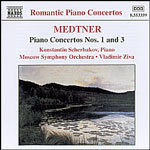
Medtner: Piano Concertos 1 and 3
 $25.00
In Stock
add to cart
$25.00
In Stock
add to cart
NIKOLAY KARLOVICH MEDTNER
Medtner: Piano Concertos 1 and 3
Konstantin Scherbakov (piano) / Moscow Symphony Orchestra / Vladimir Ziva, conductor
[ Naxos Romantic Piano Concertos / CD ]
Release Date: Friday 15 February 2002
"He and his partners are entirely sympathetic to freely associating ideas that sprout wings of the spirit and evolve into endlessly changing hues and patterns contained within a disciplined if idiosyncratic sense of form." - Gramophone
"With this recording Naxos completes its Medtner concerto cycle with Scherbakov. To have such romantic richness-once the province of specialists-offered on a bargain label is cause for celebration in itself; to have it performed and recorded with such tireless commitment is a double blessing.
"This second disc is successful on all counts. Scherbakov, praised by Richter and recently hailed as a 'modern Rachmaninov', is now more attuned to Medtner's widely flunctuating idion, complementing his unquestioned virtuosity with inwardness and conviction. Sample the passage beginning at 6'30" in the Third Concerto's finale and you will hear the sort of eloquence that warms the hearts of all true Russians. Elsewhere he and his partners are entirely sympathetic to freely associating ideas that sprout wings of the spirit and evolve into endlessly changing hues and patterns contained within a disciplined if idiosyncratic sense of form."
- Gramophone (Bryce Morrison), August 2000
Nikolay Karlovich Medtner (or Metner) was born in Moscow in January 1880 to German parents. His mother was a skilful pianist who taught him as a young child, and at the age of 12 he joined the junior class of the Moscow Conservatory where he remained as a piano student until he was 20. He was generally regarded as among the elite of Russian pianists, a virtuoso with a considerable degree of musicianship. He was later to teach at the Conservatoire, but the political climate persuaded him to leave Russia to seek asylum in Paris with his friend, Rachmaninov. There he found the Russian fraternity not to his liking, nor for that matter did France like him or his music.
His tours took him to the United States where he was very well received, and to his favourite country, England. It was there that in 1935 he decided to make his home, dying in London in 1951.
He was a largely self-taught composer, having received just the basics of writing given to all students at the Conservatory. He was, however, to write a large quantity of music for the piano, including three piano concertos, over 100 songs and a small amount of chamber music. The significant difference between his compositions and those of the late-Romantic Russian school was the restraint and a classicism that returns music to the academic style of Mozart and his contemporaries. Indeed his works are excellent examples of pure musical form, free of the emotions that inhabit Rachmaninov's music.
Towards the end of his life he was persuaded to record much of his music, but his technique had suffered, and in 1944 gave up his concert engagements.
Medtner wrote three concertos spread over the period 1914 to 1943. They were written not in the free style of the Romantic composers, of whom he was a great exponent as a performing pianist, but in a very formalised manner that looked back to the classical forms of Mozart. Though seeking this structured form, the First and Third concertos are far from conventional in their layout. The first, which took four years to complete, starting in 1914, is in three major movements with a 'recapitulation' linking the second and third movements. The second movement is unusual in itself, being a theme and variations, in place of a slow movement. Though Medtner was a skilful orchestrator, much of the orchestral writing is in the form of an accompaniment of the soloist. At the same time the pianist is not given a part of overt showmanship, the role often being of dexterity. Only in the final movement does the orchestra play a substantial role, the big sweeping melodies apparently taking the work to a bold ending, but, in fact, it has a closing passage of peaceful restraint. The Third Concerto is in two extensive movements linked with a very brief Interludium. This dates from 1940-43, and for a moment in the last movement we move back to Tchaikovsky, as the composer gives the orchestral brass a major participation. Yet again the soloist's brilliance must come from the myriad of notes, often at mercurial pace.
Konstantin Scherbakov was born in 1963 in Barnaul, Siberia, and studied at the famous Gnesin School in Moscow before moving to the Tchaikovsky Conservatory in 1981 as a pupil of Lev Naumov. In 1983 he won the Moscow Rachmaninov Competition, and major prizes were achieved in the Montreal International Competition, Busoni Piano Competition and the Géza Anda Competition. He has given concerts in over one hundred Russian cities, and his overseas tours have included France, Germany, Italy, Switzerland, England and Czechoslovakia. He is also a member of the teaching staff of Moscow Conservatory, where he is an assistant to Lev Naumov. He has recorded extensively, and his Naxos and Marco Polo releases have included music by Godowsky, Respighi and Liapunov. Gramophone magazine describes his playing as having "pinpoint articulation, his unerring sense of rhythmic drive and security".
Tracks:
Piano Concerto No.1 in C minor, Op.33
01. Allegro- 11:59
02. Tranquillo, meditamente- 13:13
03. Tempo I- 02:20
04. Allegro molto 07:18
Piano Concerto No.3 (Ballade) in E minor, Op.60
05. Con moto largamente- 14:42
06. Interludium: Allegro, molto sostenuto, misterioso- 01:34
07. Finale: Allegro molto-Svegliando, eroico 18:38